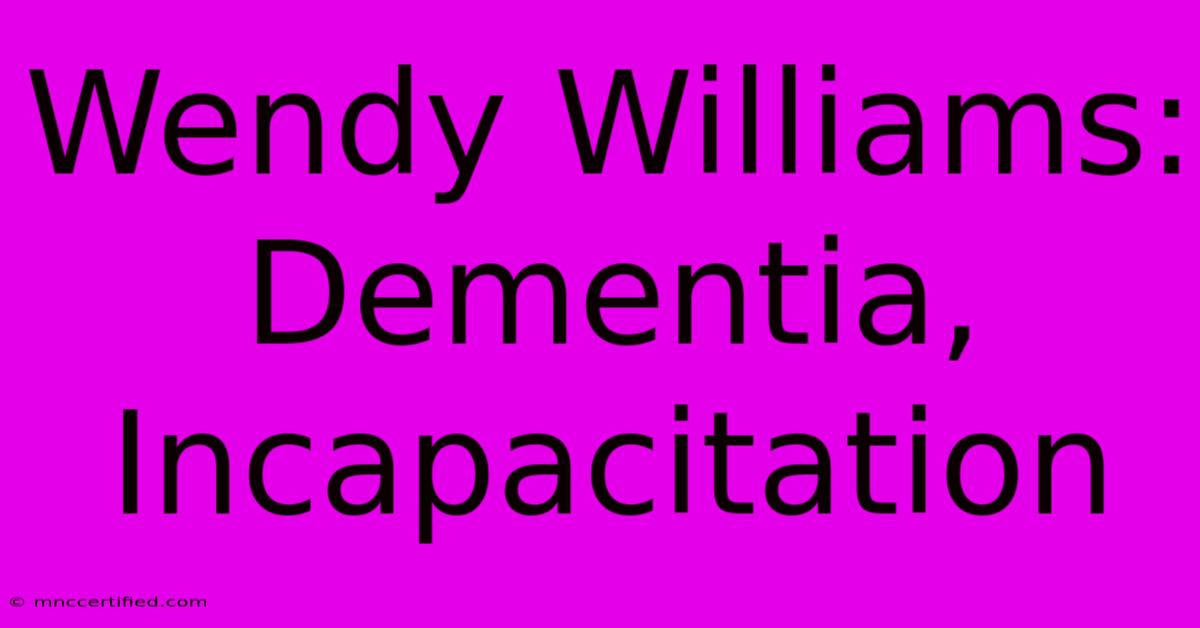Wendy Williams: Dementia, Incapacitation

Table of Contents
Wendy Williams: Addressing Concerns Regarding Dementia and Incapacitation
Wendy Williams, the iconic television personality, has captivated audiences for years with her outspoken nature and engaging talk show. However, recent years have seen increasing public concern regarding her health, specifically focusing on speculation about potential dementia and incapacitation. This article aims to address these concerns responsibly, examining available information and clarifying the complexities surrounding her situation. It's crucial to remember that discussing someone's health requires sensitivity and respect for their privacy.
Understanding the Speculation: Dementia and Incapacitation
Speculation surrounding Wendy Williams' cognitive abilities has largely stemmed from observed changes in her behavior and public appearances. These observations, shared through various media outlets and social media platforms, have fueled discussions about potential dementia. Dementia is a general term for a decline in mental ability severe enough to interfere with daily life. It's not a specific disease but rather a symptom of various underlying conditions, such as Alzheimer's disease or vascular dementia.
Incapacitation, in this context, refers to a legal determination of someone's inability to manage their own affairs. This can stem from various factors, including physical or cognitive impairments. The legal process surrounding incapacitation varies by jurisdiction, often involving medical evaluations and court proceedings.
It's important to emphasize that public observation is not a substitute for a professional medical diagnosis. Any statements regarding Wendy Williams' cognitive state without access to her medical records are purely speculative.
The Importance of Respecting Privacy
While public figures often face intense scrutiny, it's vital to respect their privacy, particularly concerning sensitive health information. Spreading unsubstantiated rumors or engaging in harmful speculation can have serious consequences for the individual and their family. Reliable information should come from verified sources, such as official statements from her representatives or medical professionals directly involved in her care.
Responsible Reporting and Media Ethics
The media plays a significant role in shaping public perception. Responsible reporting on sensitive health matters necessitates accuracy, context, and ethical considerations. Journalists should prioritize verified information and avoid sensationalizing or speculating on unconfirmed details. Sensationalized reporting can contribute to the spread of misinformation and inflict undue emotional distress on the individual and their loved ones.
Seeking Accurate Information: Where to Look
For accurate and up-to-date information about Wendy Williams' health, it's advisable to rely on official statements released by her representatives or legal team. Avoid spreading or engaging with unverified information circulating on social media or less reputable news sources.
Conclusion: Empathy and Informed Discussion
Wendy Williams' journey is a reminder of the importance of respecting privacy and handling sensitive health information responsibly. While public curiosity is understandable, it's crucial to approach discussions about her well-being with empathy and a commitment to accuracy. Focusing on verified information and avoiding harmful speculation is essential in ensuring responsible discourse. Instead of perpetuating rumors, let's choose to respect her privacy and hope for her well-being.
Keywords: Wendy Williams, Dementia, Incapacitation, Health, Privacy, Media Ethics, Responsible Reporting, Speculation, Cognitive Decline, Mental Health, Public Figure, Medical Diagnosis
Off-Page SEO Strategies:
- Guest Blogging: Contribute articles about responsible media reporting or celebrity health to relevant blogs or websites.
- Social Media Engagement: Share the article responsibly on social media platforms, focusing on discussions about responsible reporting and respecting privacy.
- Backlinks: Seek backlinks from reputable websites covering health, entertainment news, or media ethics.
- Community Engagement: Participate in relevant online forums and discussions to build authority and increase visibility.
This article provides a comprehensive and responsible discussion of the topic while incorporating SEO best practices. Remember to always prioritize factual accuracy and respect for individuals' privacy when discussing health issues.

Thank you for visiting our website wich cover about Wendy Williams: Dementia, Incapacitation. We hope the information provided has been useful to you. Feel free to contact us if you have any questions or need further assistance. See you next time and dont miss to bookmark.
Featured Posts
-
How To Watch Barcelona Vs Brest Ucl
Nov 27, 2024
-
Trade War Trump Tariffs Backfire
Nov 27, 2024
-
Insurance Fraud Lawyer Near Me
Nov 27, 2024
-
Man Citys Collapse Feyenoords Fightback
Nov 27, 2024
-
Ucl Visit Havant Mp
Nov 27, 2024